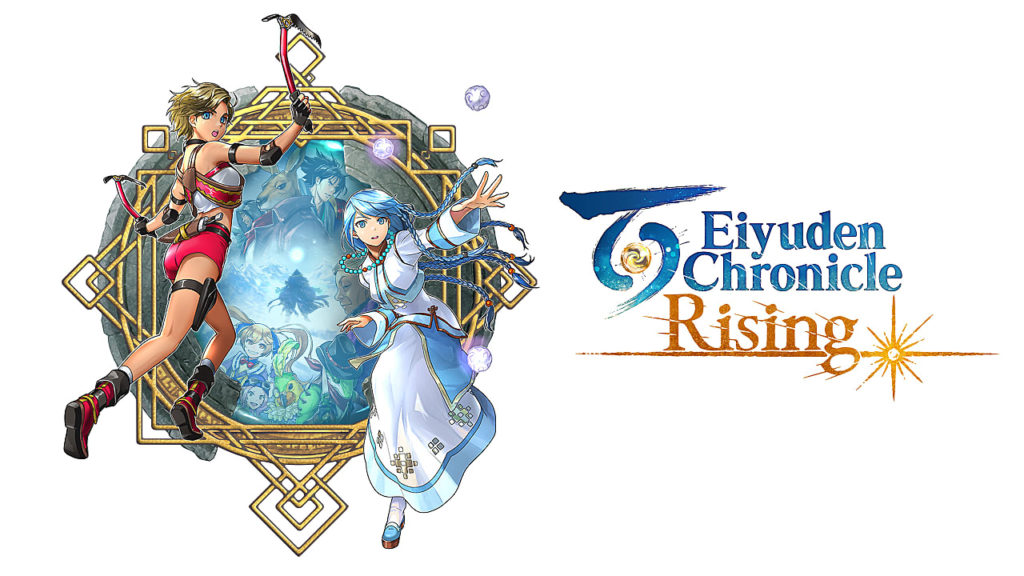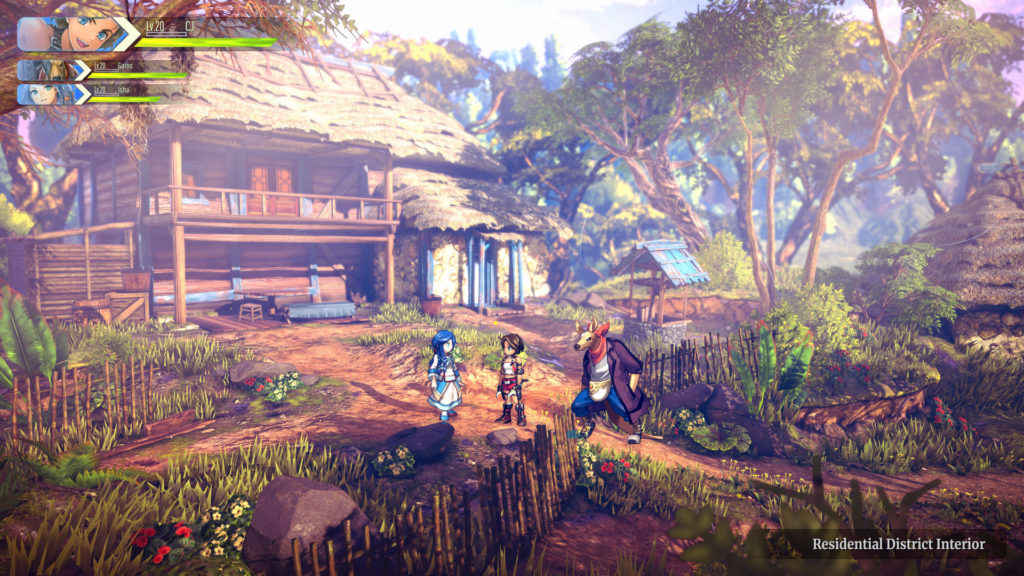Eiyuden Chronicle: Rising is a “companion game” to the core game Eiyuden Chronicle: Hundred Heroes, which is still in development. Hundred Heroes is a Kickstarter headlined by Yoshitaka Murayama (story) and Junko Kawano (art), veterans of the original Suikoden. The Kickstarter is clearly designed to invoke the feel of the Suikoden series. Eiyuden Chronicle: Rising serves as a kind of teaser for the game world as well as a standalone, relatively casual, action RPG. As a teaser for a future game, it works reasonably well. Isolated from that context, I’m not sure it’s a great action RPG, although I did enjoy it.

As Jay observed in a comment on a prior post, Eiyuden Chronicle: Rising is similar to Ys III (not just because many of the environments line up – that’s just a happy coincidence). It’s a simple action RPG focused around exploration and resource collection. Although you get a few extra character mechanics over time, and you unlock additional party members, the pace and structure of the game incentivize you to play as main character CJ much of the time. While the other characters are useful for specific encounters, CJ has good flexibility and moves the fastest.
One reason moving quickly is appealing is that Rising is fairly slow-paced. Although there is fast travel between town areas and dungeon save points, you traverse the same areas several times, especially when you’re working on one of Rising’s dozens of quests. The slow movement is particularly evident while walking through the town, where you can’t use CJ’s dash techniques to move quickly.

While many will find Rising’s quests to be tedious – some are particularly baffling, such as “talk to this person next door” – I found them by and large to be somehow comforting. CJ is obsessed with collecting stamps, and is willing to do just about anything to get more – and when you’re in town, your stamp count is front and center, and it’s hard not to feel the same. Seeing them gradually increase as you take care of the townspeople’s laundry is satisfying. Sometimes the quests require a foray into a dungeon, but you can complete many as soon as you get them simply by having the materials requested already on hand.
The cast stands out in Rising – between all the various character introductions and the ways they interact with each other, it feels like one of Suikoden 3’s chapters reimagined as an action RPG. The main characters are the only ones that receive much development. As I got further and further in Rising it felt like they bonded with each other and I bonded with them. The minor cast members add some flavor and make the town feel more alive; as things develop, you see them more often. One thing I miss in Rising that I like about most RPGs, though, is that even though you see these minor characters and townspeople frequently, you cannot interact with them unless they are part of a quest. One of the joys in each Suikoden – particularly the first time playing – is talking to the people in your castle (even in the one where that castle is a boat). It seems like a major oversight, even in a companion game, not to have that feature.

I have been playing and enjoying the Suikoden series for a long time, and when I had the time to play more RPGs, I tried to play through the series yearly. Rising inspires some confidence that Eiyuden Chronicle could be similar to the Suikoden series. At the same time, I’ve been burned by Kickstarters before. I’m going to do my best to remain cautiously optimistic, and in the meantime I’m satisfied to have experienced Rising itself.


im glad we got some content up about this game since i think at least three of us are playing or have played it recently.
when the eiyuden chronicles kickstarter was launched i was very excited to be getting another game from murayama since suikoden seems so dead. i considered completely ignoring this, but ultimately kicked in a few extra bucks for a copy out of support and curiosity, and i am glad i did.
it isnt an amazing or innovative game by any stretch, but it is a nice, simple game that gives me something light to do between stretches of elden ring and other heavier fare. i like the characters, i like the setting, the town building and crafting and simple enough i dont resent them. i am at about 14 hours and thing the game is wearing out its welcome a bit, but for the first ten or so hours i really liked it. i also think in the later parts, there is more friction (less likely to have the materials and need to grind, slightly harder encounters) that mean the game isnt serving the role i am using it for.
i do think there is some interesting conversation between this review/game and christian’s piece from yesterday. there is no metagame as far as i know, but there is a (simple) crafting system, quests (esp side quests) are quite commodified, a lot of things level up, nothing is technically copy-pasted but you do retraverse the same areas a lot. not sure how to judge compulsion driven design. i am not sure what my point is here. the game doesnt feel like gatcha, but does have a one-more-quest type feeling to it. not sure what to make of that. maybe there is a risk of applying the “aesthetic gatcha-ism” points too broadly.
I actually didn’t add Rising on in my kickstarter pledge. It sounds like that likely worked out to my benefit, since key distribution was a mess. Hope you didn’t run into that.
I agree that there’s some aesthetic gatcha-ism at play here – the food system (which permanently increases stats a small amount) in particular felt tacked on when for much of the game money is in very tight supply. The “big” weapon/armor upgrades feel much less offensive than the “small” ones, since they add combat features.
Your observation that the game feels like it’s wearing out its welcome matches around the point where I was getting tired of the mechanics. That happily coincided with the story starting to take center stage (finally), which got me through to the end on a positive note.
I was typically playing 15-45 minutes at a time, so being able to “complete” measurable tasks helped me to enjoy it more than most.
Thanks for the review, and I completely agree that this game succeeds at making me somewhat more excited about Eiyuden Chronicles and being a great cup of cold water between Elden Ring sessions. I also like the character interactions, and indignantly wished I could just talk to people in town. I really enjoy the effort that went into things like item descriptions and the different patterns of speech that characters have, though I still can’t decide if CJ is supposed to speak with an Australian accent.
I’ve felt the whole time like the game would be best suited for switch (or mobile, honestly), since it goes down smoothest in 5 – 30 minute chunks.
i finished this over the weekend, switch version. light spoilers follow, but i will avoid being specific.
the last few chapters of the game introduce a plot that feels much more like suikoden than anything that happens in the first 90%. all of a sudden there is international politics and intrigue as countries try to gain advantage over each other and send emissaries to do their bidding. more of that earlier would have made the game feel more like suikoden, but it does tee up the main game for some potentially interesting stories.
i think my party wiped twice the entire time i played and one time was on the final boss. of course it is a bit of a difficulty spike, but nothing too serious or unfair. overall my assessment hasnt really changed: good, simple game in a cool setting with interesting characters, but overstayed its welcome a bit (total playtime was 17:02, should have been more like 10).